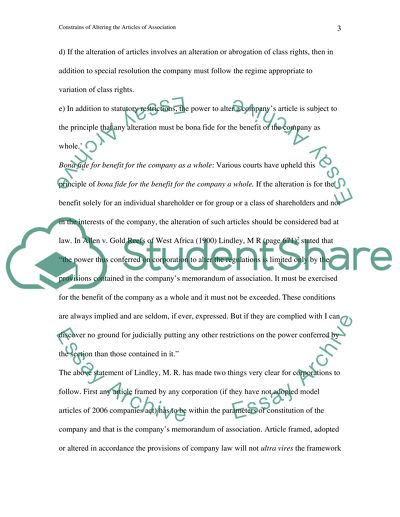Cite this document
(Constrains of Altering the Articles of Association Essay, n.d.)
Constrains of Altering the Articles of Association Essay. Retrieved from https://studentshare.org/law/1551446-the-power-thus-conferred-on-companies-to-alter-the-regulations-contained-in-their-articles-is-limited-only-by-the-provisions-contained-in-statute-and-the-conditions-contained-in-the-companys-memorandum-of-associationwide-however-as-the-languag
Constrains of Altering the Articles of Association Essay. Retrieved from https://studentshare.org/law/1551446-the-power-thus-conferred-on-companies-to-alter-the-regulations-contained-in-their-articles-is-limited-only-by-the-provisions-contained-in-statute-and-the-conditions-contained-in-the-companys-memorandum-of-associationwide-however-as-the-languag
(Constrains of Altering the Articles of Association Essay)
Constrains of Altering the Articles of Association Essay. https://studentshare.org/law/1551446-the-power-thus-conferred-on-companies-to-alter-the-regulations-contained-in-their-articles-is-limited-only-by-the-provisions-contained-in-statute-and-the-conditions-contained-in-the-companys-memorandum-of-associationwide-however-as-the-languag.
Constrains of Altering the Articles of Association Essay. https://studentshare.org/law/1551446-the-power-thus-conferred-on-companies-to-alter-the-regulations-contained-in-their-articles-is-limited-only-by-the-provisions-contained-in-statute-and-the-conditions-contained-in-the-companys-memorandum-of-associationwide-however-as-the-languag.
“Constrains of Altering the Articles of Association Essay”. https://studentshare.org/law/1551446-the-power-thus-conferred-on-companies-to-alter-the-regulations-contained-in-their-articles-is-limited-only-by-the-provisions-contained-in-statute-and-the-conditions-contained-in-the-companys-memorandum-of-associationwide-however-as-the-languag.


